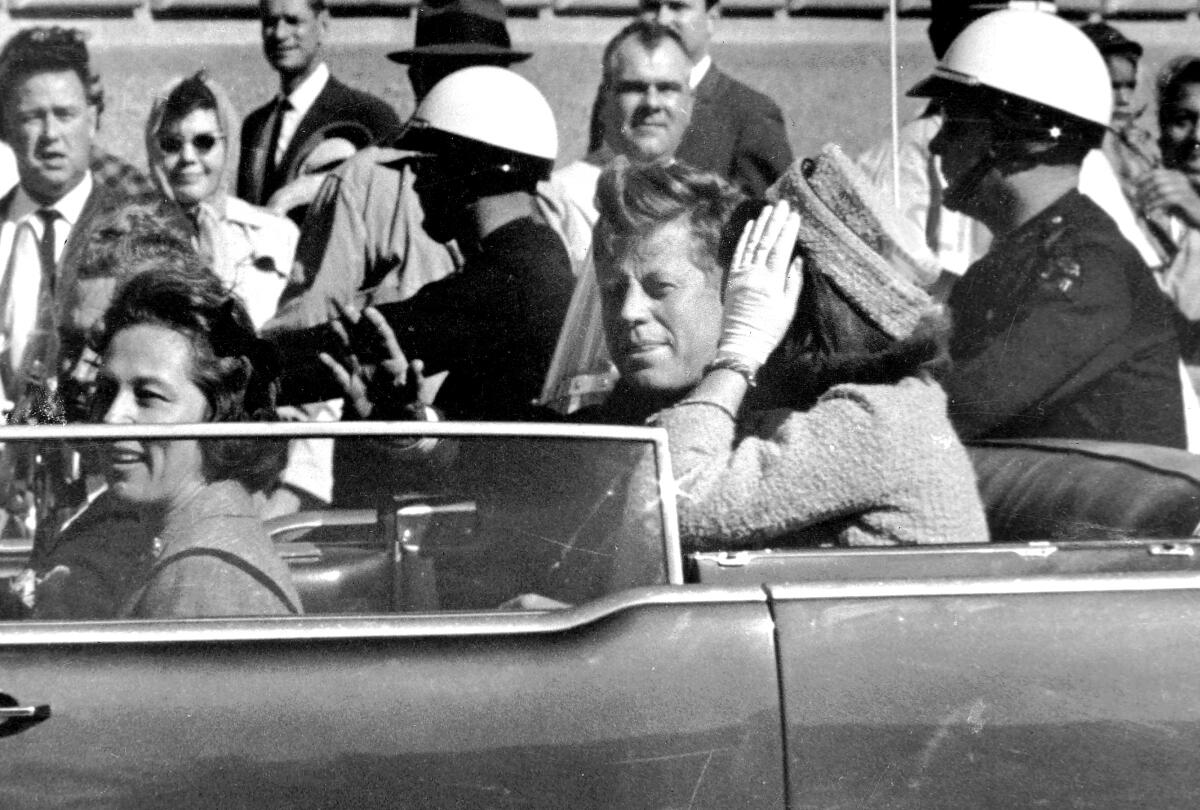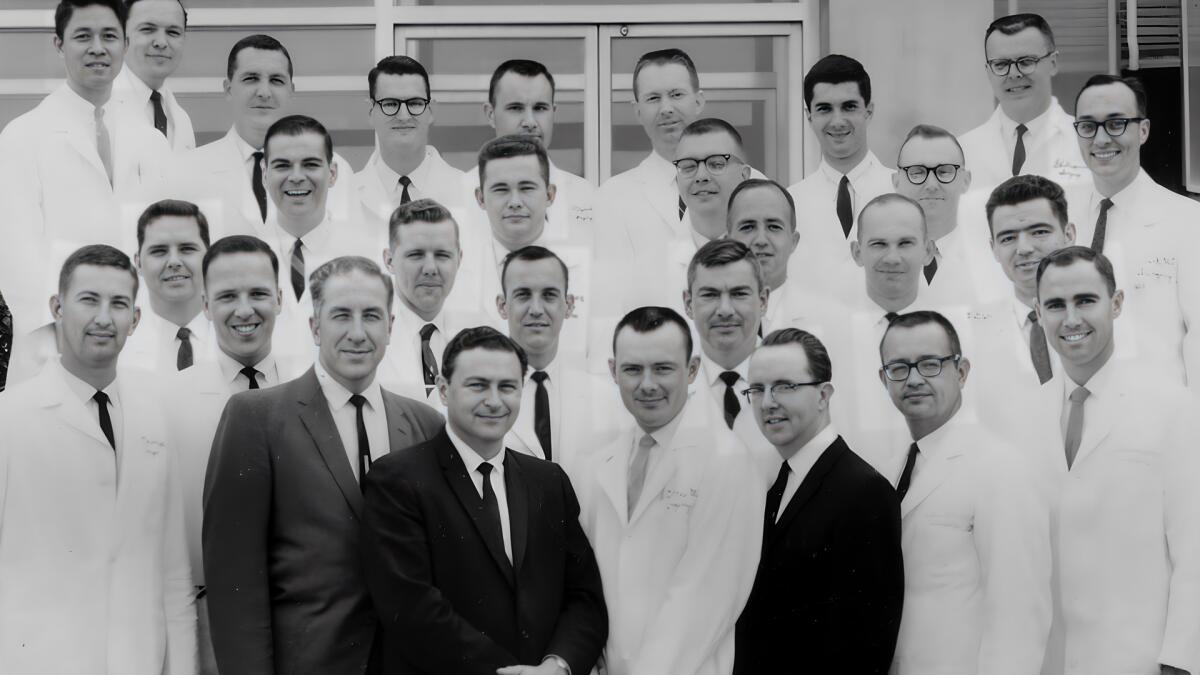60 years later, JFK’s assassination still raises questions. These 3 docs have (some) answers

- Share via
Wednesday, Nov. 22 is the 60th anniversary of the assassination of President John Fitzgerald Kennedy. Do people, by which I mean people younger than me — and that is a whole lot of people — still recognize this date, let alone its importance?
We’re used to the idea, from science fiction, that even small alterations to the past can change the present for the worse. But the last six decades really might have taken a different course, in a good way, I mean, had Kennedy survived; it was a critical moment in history, a node in the timeline. In any case, it’s hard to imagine that where we might have gone could be worse than where we are now, politically speaking.
That we’ll never know is part of what keeps the story alive; there’s nothing like a story cut off halfway to make you thirst for the ending. The most mythologized humans in our culture all died young, suddenly or violently: Elvis, Marilyn, James Dean, Abraham, Martin and John.
There’s more to it than that, obviously. Those people were special in their own right, already charismatic, talented, dedicated to bringing forth a better world. We don’t spend as much time mulling the unfulfilled promise of James Garfield or William McKinley, presidents every bit as assassinated as JFK or Lincoln, or wondering if there’s more to the story than the history books tell. Nobody wonders for long, at any rate, while the Kennedy assassination is a cottage industry, to understate the case — a subject for books and movies and television shows, for fiction and nonfiction and that gray area between them called the conspiracy theory.
Coverage of the Kennedy assassination 60 years ago changed the course of TV news and shaped the careers of some of America’s best known journalists.
Jack and Jacqueline Kennedy were often likened to “movie stars” in looks and charisma, but television was the medium that made them. His political career began in 1947, the same year that “Meet the Press” premiered, just as television was getting up on its feet; by the time of the first presidential debate with Richard Nixon, in 1960, 90% of American households had a television. It’s often said that Kennedy won the first debate on TV and Nixon, who looked fidgety and pale, on the radio. With 70 million people viewing, that was a big enough audience to gain advantage in a tight race.
The Kennedys were not your average Americans — both Jack and Jackie came from money — and yet, as a young couple with small children, they were widely relatable. (Daughter Caroline was 3 when they entered the White House; John Jr. was born just before Inauguration Day.) They cleaned up well for formal occasions, Jackie in her exclusive Oleg Cassini creations, John in white tie and tails, but they were even more appealing glimpsed at rest or play or on the water off Hyannis Port. I’ve always felt some incidental connection between the Kennedys and the Petries, of “The Dick Van Dyke Show,” which premiered in 1961, the first year of the Kennedy administration. Coincidentally, the age spread of both couples was nearly the same — 11 years separated Van Dyke and Mary Tyler Moore, 12 the Kennedys — even as the difference wasn’t especially apparent.
Swollen with conspiracy theories, and anti-conspiracy theories, official reports and differing official reports, arguments about what the evidence showed or what the evidence was altered not to show, the book on the assassination refuses to stay closed. A decade ago, the 50th anniversary of Kennedy’s death produced a bumper crop of documentaries and docudramas, but there have been many over the years, and a few timed to the current anniversary are worth noting.

The most extraordinary of these is the melancholy, moving “JFK: One Day in America,” from Nat Geo (streaming on Hulu). Presented in three parts, it covers a bit more than one (very busy) day, from the Kennedys’ arrival in Texas to his funeral in Washington. An emotional history more than a recitation of facts, it knits footage from diverse sources — much of which seems to have been upscaled or restored — into something that feels like a real-time account, unusually immediate and detailed. At the same time, with its often wordless passages of music and pictures — there is no omniscient narrator — the series comes across as an epic, dark tone poem, a dream, driven by the memories of witnesses and participants, including reporters, policemen, Secret Service agents attached to the first lady and the co-worker who gave Lee Harvey Oswald a lift to work that fatal day. Some still seem stunned.
At eight hours, History Channel’s “Kennedy,” now streaming, is a deep dive into its subject’s life, from cradle to grave. Narrated by Peter Coyote, the voice of Ken Burns documentaries — which “Kennedy” very much resembles — it aims to be as exhaustive as is practical, and goes beyond the best-known photos and film clips to create something that feels fresh. (The dedicated JFKologist may be familiar with all the facts, but I was regularly surprised and enlightened.) Most fascinating, because less frequently documented, are the episodes of his youth — Jack was frail but scrappy and mischievous — and of the years he spent in Congress, building allies and learning the ropes of politics and self-presentation. The PT 109 episode, in which the Japanese sank Kennedy’s patrol boat off the Solomon Islands during World War II, comes to suspenseful life here. Even if you know something about Kennedy’s lifelong health problems, their extent and seriousness are shocking: He was given last rites twice before his last last rites. The series is not a hagiography — it notes Kennedy’s womanizing, without getting specific as to names, and his policy failures — but it shows him to be an extraordinary person; a thoughtful, powerful leader; and, not least a devoted father and, in his way, husband. (Jackie is impressive as well.)
Most specifically related to the assassination is Barbara Shearer’s “JFK: What the Doctors Saw,” (Paramount+, now streaming), which gathers surviving doctors who were there in the very crowded trauma room at Parkland Memorial Hospital when the president was brought in. (A dramatization, “Parkland,” was released in 2013.) All agree that the wounds — small in front, massive in back — suggested a bullet shot from the front, which means a second shooter, and that the autopsy, performed back east, did not accord with their collective memory. Some theorists have run with this, alleging that, in order to ensure that Oswald would be identified as the sole shooter, the body was switched from one casket to another, the wound to his skull repaired, and so on. But as the doctors have no agenda past sharing what they recall, their version seems beyond argument.
Which isn’t to say I was convinced. There are too many variables, too much contradictory information. Perhaps it’s best not to take a side on the who, how and why of the Kennedy assassination, just as, say, we let relativity and quantum mechanics uneasily coexist without being able to mush them into unified theory. We don’t know everything, but what we know is extraordinary and affecting. You can let the story lie or spend a lifetime trying to write an ending — people do! And if the story of John F. Kennedy tells us anything, it’s that life is short, and there is pressing new business to attend to.
More to Read
The complete guide to home viewing
Get Screen Gab for everything about the TV shows and streaming movies everyone’s talking about.
You may occasionally receive promotional content from the Los Angeles Times.








